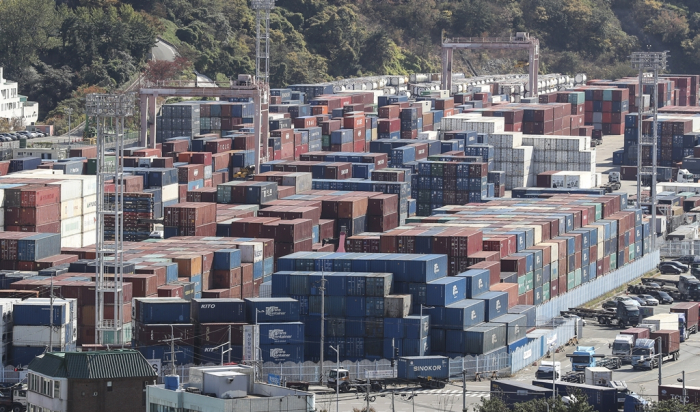Economy
Falling Korea current account surplus heightens economic woes
Korean firms’ overseas unit sales skid for the 1st time in nearly 2 years, indicating the global downturn has already hit the economy
By Nov 08, 2022 (Gmt+09:00)
1
Min read
Most Read
MBK’s Korea Zinc takeover attempt to spur search for white knights


Korea Zinc, MBK face proxy war for zinc smelter


Korea Zinc shares skyrocket after buybacks in tender offer


Lotte to liquidate rubber JV in Malaysia, sell overseas assets for $1 bn


Samsung to unveil 400-layer bonding vertical NAND for AI servers by 2026



South Korea’s current account surplus has shrunk on falling exports, adding to concerns over a slowdown in Asia’s fourth-largest economy amid a global downturn.
The country reported a current account surplus of $1.6 billion in September, far lower than $10.5 billion a year earlier, preliminary central bank data showed on Tuesday. Goods exports slid 0.7% to $57.1 billion, while imports jumped 18% to $56.6 billion.
South Korean companies’ sales from overseas units fell for the first time in nearly two years, indicating that the global economic slowdown has already bitten into the export-reliant economy. Net exports of goods under merchandising tumbled 30% to $1.5 billion on-year, logging the first slide since October 2020.
“The exports had been alright until the third quarter, but uncertainties grew on the sluggish IT sector and shrinking global demand,” said a Bank of Korea official.
The country’s total exports skidded for the first time last month, the clearest sign yet that the economy is in a severe downturn.
ENERGY IMPORTS JUMP AHEAD OF WINTER
In the first nine months of the year, South Korea logged a current account surplus of $24.1 billion in total, less than half of the $67.4 billion a year earlier.
That came as higher energy prices boosted the country’s import bills for raw materials.
In September, commodity imports grew 23.5% on-year with purchases of energy resources jumping ahead of the winter months in the northern hemisphere. Gas imports surged 165.1%, while those of crude oil and coal soared 57.4% and 32.9%, respectively.
The travel account deficit rose 12.6% to $541 million in September from a year earlier as countries worldwide opened up their borders, easing restrictions against COVID-19. The shortfall was near half a $974.6 million deficit in August, but a Bank of Korea official said the deficit is unlikely to fall further.
“Excluding the seasonal factors, outbound travelers are increasing,” said the official.
Write to Mi-Hyun Jo at mwise@hankyung.com
Jongwoo Cheon edited this article.
More to Read
-
 BOK may raise rates by 50 bps again on Fed, inflation
BOK may raise rates by 50 bps again on Fed, inflationNov 03, 2022 (Gmt+09:00)
2 Min read -
 EconomyKorea’s 1st export decline in 2 years dims BOK’s big-step rate hike outlook
EconomyKorea’s 1st export decline in 2 years dims BOK’s big-step rate hike outlookNov 01, 2022 (Gmt+09:00)
3 Min read
Comment 0
LOG IN


